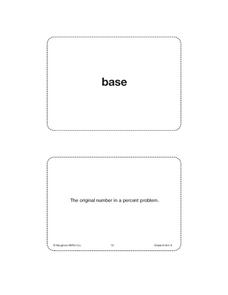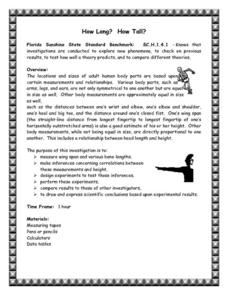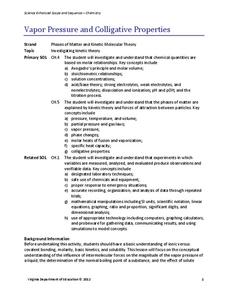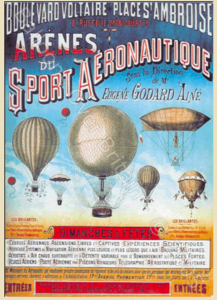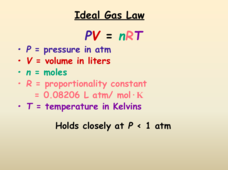Curated OER
From Probability to Combinatorics and Number Theory
Students see how division is used to help solve probability problems. They use tables as data structures where they are used to count outcomes and to compute probabilities. Students use games to help solve probability problems.
Curated OER
A Model for Natural Selection- Spaghetti Worms
Does the early bird really get the worm? If so, which color of worm does it prefer? In an exciting and easy week-long field investigation, young field biologists set up a one square meter feeding area for birds. If you have a webcam,...
Houghton Mifflin Harcourt
Unit 6 Math Vocabulary Cards (Grade 6)
Fifty-eight flashcards make up a set designed to reinforce math vocabulary. Within the set, you'll find bold-faced word cards as well as definition cards that offer a labeled example. Terms include base, percent, theoretical probability,...
Curated OER
Leonardo da Vinci
Students select appropriate tools and technology to perform tests, collect data, and display data. They construct appropriate graphs from data and develop qualitative statements about the relationships between variables.
Curated OER
War and Religion
Students analyze perspectives of war. In this war and religion lesson, students collaborate to research anti-war and pacifist positions on war as well as "just war" theory. Students compose essays regarding perspectives of war.
Colorado State University
How Far Away Is Space?
Outer space may be a lot closer than you think! Science scholars model the layers of the atmosphere using transparencies to gain insight into the scale of space. The resource includes ideas to tailor the activity to the skill level of...
Curated OER
Art and Anatomy: The Vitruvian Teen
Twelfth graders create an artistic version of a Vetruvian teen. In this anatomy lesson, 12th graders design an experiment to test the theory of the ideally proportioned man. They present their findings in class.
Curated OER
Cost and Revenues
Students develop the key concepts of total, variable, fixed, average and marginal costs. The theory of using different business scenarios is applied to different situations for an extension to real life application.
Curated OER
Teaching about Increased Conductivity: Are Culverts The Culprits?
High schoolers encounter the complexity of identifying the cause of unusual variations in WOW conductivity data. They propose theories on why there was a sudden increase in conductivity in Ice Lake, Minnesota during July of 1998.
Curated OER
Physics and the Quantum Mechanical Model
In this physics worksheet, students review vocabulary terms and key equations associated with the quantum mechanical model. Students apply the quantum theory to explain the photoelectric effect. This worksheet has 5 true or false, 12...
Curated OER
Clipbirds
Students attempt to pick up various objects with a wide variety of beaks, including scissors, spoons, etc.
Curated OER
Comparing Notes: a Mathematical Exploration of the Piano
Students examine the history of equal temperament, the modern standard of tuning a piano. Proportion calculations of octaves and perfect fifths are utilized to calculate the frequency of each note in a major scale.
Curated OER
How Long? How Tall?
Seventh graders investigate the parts of the human body and examine the symmetry of body parts like arms and legs. They measure the body parts and take individual height and weight to compare the quantities. Student examine whether the...
Virginia Department of Education
Charles’ Law
Searching for a relatively interesting way to demonstrate Charles' Law? Here is a lesson in which pupils heat air inside a flask and then cool the flask to quickly cool the air. They make observations about what occurs during the cooling...
New Mexico State University
Lab 6: Kepler's Laws
A 15-page package thoroughly teaches your physics or astronomy learners about Kepler's three laws of planetary motion. Each one is stated and explained. Class members answer questions, solve problems, and participate in the classic...
Virginia Department of Education
Vapor Pressure and Colligative Properties
Hate to vacuum, but enjoy using a vacuum pump? Explore a lesson that starts with a demonstration of boiling water at various temperatures by using a vacuum pump. Then scholars design their own experiments to measure vapor pressure and...
Virginia Department of Education
States of Matter
Scientists have been studying exothermic reactions before they were cool. The lesson begins with a discussion and a demonstration of heat curves. Scholars then determine the heat of fusion of ice and the heat needed to boil water through...
Science Geek
Gas Laws
A physical science presentation begins with an explanation of ideal gases and their behavior. Then it introduces all of the gas laws with descriptions and formulas.
Virginia Department of Education
Thermochemistry: Heat and Chemical Changes
What makes particles attract? Here, learners engage in multiple activities that fully describe colligative properties and allow the ability to critically assess the importance of these properties in daily life. Young chemists conduct...
Virginia Department of Education
Heat Transfer and Heat Capacity
It's time to increase the heat! Young chemists demonstrate heat transfer and heat capacity in an activity-packed lab, showing the transitions between solid, liquid, and gaseous phases of materials. Individuals plot data as the changes...
Virginia Department of Education
Partial Pressure
At some point, everyone has been under pressure—even Dalton! Explore Dalton's law of partial pressures with young chemists as they measure the volume of air extracted from a sample compared to its original volume. Class members perform...
Curated OER
Count Marsili & the Mediterranean Current
Students integrate history and science while discovering how salinity affects the density of water. After a lecture/demo, students work in groups to complete a lab activity that demonstrates how salinity affects the density of water.
Curated OER
Pixel Drawings
Middle and high schoolers re-create a magazine photo or other picture and make it into a drawing using pixels. This fun art project should be a hit with your charges! The materials needed to implement the instructional activity should be...
Science Geek
The Ideal Gas Law
When doing a gas lab, you might feel under pressure. A short presentation discusses the Ideal Gas Law. It begins with the units for each variable, then describes the behavior of real gases. The lesson concludes with a comparison of...




